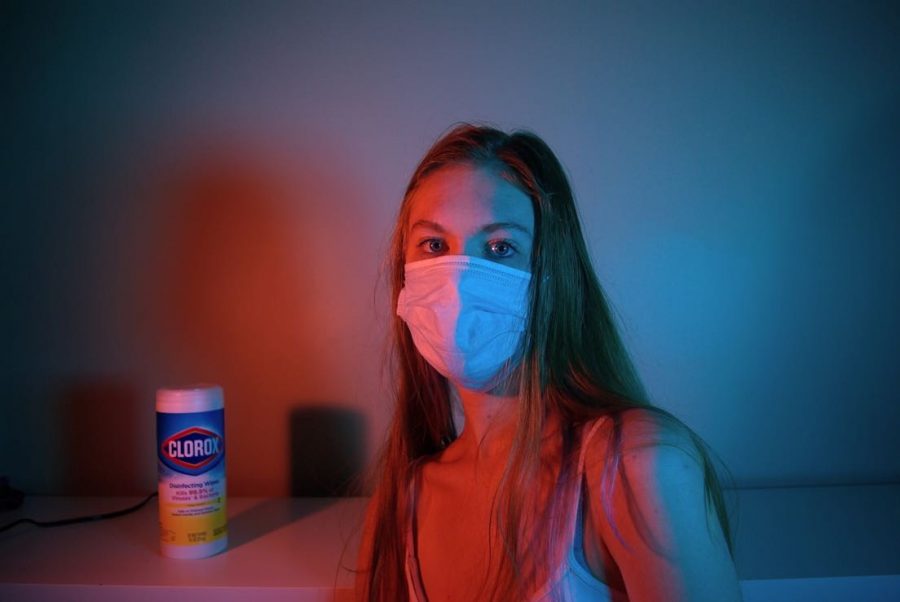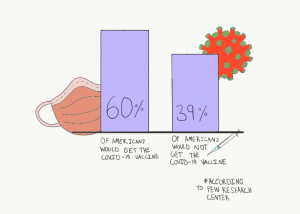What to focus on after COVID-19
New year, new questions
Photo submitted by Ivy Lariviere
Ivy Lariviere poses for a self portrait on June 29, portraying the feel and reality of 2020 and now 2021 by including a face mask and Clorox in the background.
January 10, 2021
There is no doubt that after our crazy year of 2020, everyone’s a little nervous to find out what 2021 has in store for us. Everyone’s anxious to know if the pandemic will worsen and if so, how badly. Many also wonder how many more beloved celebrities will pass away so unexpectedly, or even if global warming will start to worsen again once life is back to normal after it’s small recovery, causing more deadly and raging fires throughout the world. Although no one can answer these questions and be 100% accurate, we can still learn what we can to predict and prepare.
In October of 2020, The Medical Futurists wrote one of their articles off of a common question that many of late now have. In one of their surveys, 538 civilians asked how they and the public could be reassured that the vaccine is safe to take. The simple response given to them was, “trust science, not politics.”
When asked what she hopes for in the new year, Pediatrician Dr. Mollie Malaney of Stillwater, MN’s Health Partners Medical Group, responded saying that she hopes “science becomes a bigger force for change rather than myth or theory.”
Dr. Malaney goes on to explain how she hopes more people will start to trust science and get vaccinated allowing us to get some normalcy back in our lives.
Just days before the announcement of the Pfizer vaccine, a new healthcare organization named Mira, wrote an article on public health citing Dr. Anthony Fauci, the director of the National Institute of Allergy and Infectious Diseases. Fauci explained that if we produce a vaccine that is only 70 percent effective by early 2021, by the end of the new year we should be able to be less strict about wearing a mask or cloth face covering but not be done with them all together.
As a counter question to this research, Malaney was asked if she sees us continuing to wear masks, even after our threat has weakened. Her partially hope filled response was her belief that we will not be needing to wear masks all day, every day in the future, but she does believe in medical places, such as the Stillwater Clinic, that the requirement of face coverings will continue when doctors and sick patients meet.
In a BBC article of the possible long term effects of our COVID-19 pandemic circling around the climate revolution, BBC wrote off of satellite data that revealed the drastic drop in atmospheric levels of nitrogen dioxide and how some regions in the world have dropped close to 30-40 percent. The slow down of the world has also dropped 2020’s CO2 emissions by 8 percent.
Former Stillwater 2020 graduate, Ivy Lariviere, was questioned for her opinion on this research. Lariviere explained, “I definitely think that there will be a rise in CO2 emissions, but I don’t think it’ll be as much as what it was before the pandemic.”
She agrees that the newer advancements of staying at home will help us to keep our emissions down as more and more people will not be commuting, but staying at home.
In an interview of how this pandemic is changing our world, Professor Emily Landon from the University of Chicago expressed how she hopes more medical centers will go back in time a little by reusing gowns and masks by getting them laundered, helping us by cutting back on our medical waste by huge percentages.
After hearing of Professor Landon’s hope and opinion, Dr. Malaney explained how the Stillwater Health Partners Clinic is already reusing and getting their gowns laundered. She explained how in the non-surgical fields, it’s easier for them to be able to reuse them without the worry of cross contamination. On the point of reusing masks Malaney expressed how surgical masks are better, by a big enough extent, at trapping particles that reusing cloth masks in a medical field would be too tricky and risky for people’s health.
As some medical facilities take a couple steps back in time with cloth gowns, a McKinsey Global Survey of executives found that digitization of online interaction has been accelerated by three to four years just in this single year of 2020.
Lariviere purely believes and said, “the pandemic was a gateway for so much more online use,” She goes on to explain how things for work and education were sped along but also technology for entertainment, giving an example of theater production.
The new year of 2021 is becoming to be known and named as the year of hope. After 2020 everyone is sceptical of what more is to come but with news of two new vaccines, our hope for the future is looking stronger and greater even though our lives may never be the same as they were before.














